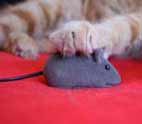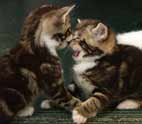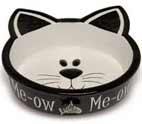Cat Separation Anxiety
How To Help Your Clingy Cat
Cat Separation Anxiety is a problem that can easily be misunderstood. It is one of those cat behavior problems that is recognised more often in children and in dogs and can easily be mistaken for being naughty.
Separation cat anxiety occurs when your cat experiences extreme anxiety, insecurity and fear when separated from their owner.
Now, we may think that it’s cute that they miss us so much, but it can be very distressing for the animal.
What Causes Cat Separation Anxiety?
Separation anxiety in children is seen as a normal phase of development. The child is developing its own identity and having to learn that when their mother (or other care giver) goes away, they are still safe and they do come back.
If the child doesn’t learn these lessons and gets stuck in that phase then they can develop a separation anxiety disorder. So a similar picture could be suggested for cats.
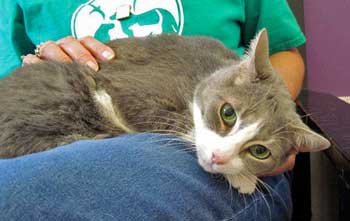
There is a theory that it may become problematic if a cat was weaned from its mother too early. Alternatively it could be a result of us over fussing and the animal getting used to having constant attention (like a spoilt child). Or simply cat anxiety resulting from sudden changes in the owners work pattern, or feeling abandoned when the owners go away on holiday. There really isn’t one simple reason.
Identifying The Symptoms
Cats who suffer with cat separation anxiety are often referred to as clingy cats but their other behaviors that can manifests and which we often mis-understand and find extremely annoying.
These can Include:
|
|
Other concerning symptoms could include:
|
|
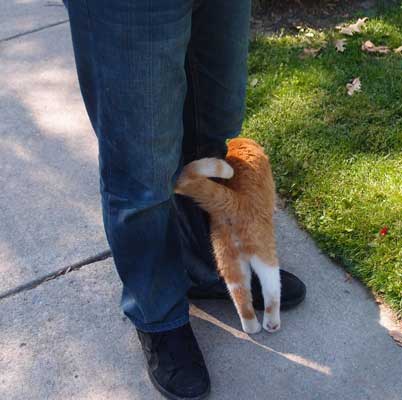
You can see how we might mistake such cat behaviour as simply misbehaving. Urinating or defecating on our bedclothes for instance. Any owner would be infuriated by this happening and the risk with that is that we might scold them – which will just make them feel even more anxious, scared and confused and therefore make the problem even worse!
But through understanding the problem, making some simple behavioural and environmental changes and perhaps with some added help of relaxing supplements such as Calm Care we can help relieve our feline friends distress.
When they urinate or defecate in places where we normally sit or sleep, that is because they associate those places with our smell, and they are adding their own scent to comfort themselves. Our own cat Little Mo did just this when we went away for a few days and we had our friends look after her instead, so we know how upsetting it can be!
So What Can We Do About Cat Separation Anxiety?
First of all, make sure that any of the symptoms (especially things like over grooming, urinating and defecating in the wrong places, and constant meowing) aren’t actually signs of other underlying health problems, discomfort or pain. Get your pet checked out at the vets as symptoms like these might actually indicate infections, bladder stones, parasites or other problems.
Ways to overcome cat separation anxiety include:
Calming Medicines and Supplements
While making some of the following changes and while your cat is getting used to learning that it doesn’t have to feel afraid when you’re not around, it can sometimes help to use a gentle calming sedative to alleviate their symptoms of stress and anxiety. Check with your vet about any prescription medicines or supplements that may be safe for your own individual pet.
|
A natural product to:
|
Desensitization:
Try to wean your pet from being so dependent on you. Only give them attention when they are not being too clingy or demanding. Don’t fuss over them for the fifteen minutes or so before you go out to work, or the fifteen minutes or so when you come home.
They may associate certain habits and items with being left alone. So try leaving your travel bags out, or their carry case, and put some of their toys in them so they don’t just associate them with you going away. Or wear your work clothes around the house occasionally to break any similar associations.
Stimulating Environment:
Make their environment more interesting for them. Cat social behavior dictates that they enjoy lots of stimulus, so provide toys, scratching posts and comfortable and secure places for them to sleep. Also, leave and make sure that they have plenty to drink and access to a clean litter tray.
Toys that provide a challenge and a reward, such as balls that you can fill with cat treats that fall out as they chase them around, can help keep your cat entertained for lengthy periods of time.
Try leaving either the television or radio on for them. This may sound strange but the sound of voices or familiar music may help to reassure them that they are not alone. There are even ‘cat videos’ available that have sound and pictures of birds and other small animals to keep their attention throughout the day.
By making such simple changes and being patient with your nervous kitty, you can help reassure them that when you go away, you do come home again and that they haven’t been abandoned. They will feel more self-assured and confident and over time, their symptoms of cat separation anxiety and stressful behaviour will be things of the past.
Find out more about Calm Care and how you can help your cat feel calmer and less stressed by learning more at PetWellbeing.com here.
Top of this Cat Separation Anxiety Page




